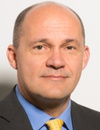Co-Located Conference AgendasLab-on-a-Chip & Microfluidics 2019: Companies, Emerging Technologies & Commercialization Track "B" | Lab-on-a-Chip & Microfluidics 2019: Emerging Themes, Technologies and Applications Track "A" | Microfluidics & Flow Chemistry 2019 | Point-of-Care Diagnostics, Global Health & Biosensors 2019 | Single Cell Analysis Summit 2019 | 

Tuesday, 8 October 201912:45 | Networking Lunch in the Exhibit Hall, Exhibits and Poster Viewing | |
Venue: Coronado Ballroom 7 |
| | 14:00 |  | Keynote Presentation Transformative Flow Chemistry: Continuous Opportunities for Continuous-Flow
Volker Hessel, Professor,, Adelaide University, Australia
Flow Chemistry has brought chemical reactions to considerable advances. Pharmaceutical manufacturers and their legislative authority (FDA) were the first to decide consequently for continuous production and more has been reported in specialty and fine chemicals.
The process design of flow chemistry remains prime innovation challenge and is not completed by far; certainly not what concerns pilot scale. An intensified flow separation is largely missing. Similarly, implementation of analytical characterization needs to be enlarged and driven by real-world needs, e.g. process-analytical technologies in the frame of pharma’s quality monitoring. For both and more process issues, conceptual and experimental studies are presented. Processes scale with ‘opportunities’ and those are opened by favorable sustainability, which is costs and environmental issues. That ‘cash-flow’ will be given. |
| 14:30 |  | Keynote Presentation From Flow Chemistry in the Lab Towards Industrial Implementation on Scale – Case Studies on Continuous API Synthesis
C. Oliver Kappe, Professor and Scientific Director, Center for Continuous Flow Synthesis and Processing, University of Graz, Austria
Continuous flow processes form the basis of the petrochemical and bulk chemicals industry where strong competition, stringent environmental and safety regulations, and low profit margins drive the need for highly performing, cost effective, safe and atom efficient chemical operations. In contrast to the commodity chemical industry, however, the fine chemical industry primarily relies on its existing infrastructure of multipurpose batch or semi-batch reactors. Fine chemicals, such as drug substances and active pharmaceutical ingredients (APIs), are generally considerably more complex than commodity chemicals and usually require numerous, widely diverse reaction steps for their synthesis. These requirements generally make versatile and reconfigurable multipurpose batch reactors the technology of choice for their preparation. However, the advantages of continuous flow processing are increasingly being appreciated also by the pharmaceutical industry and, thus, a growing number of scientists, from research chemists in academia to process chemists and chemical engineers in pharmaceutical companies, are now starting to employ continuous flow technologies on a more routine basis. In this lecture, contributions from our research group in the field of continuous flow processing will be highlighted. Emphasis will be given to highly atom efficient and process intensified chemical transformations useful for the synthesis of APIs or key intermediates that are often too hazardous to be executed in a batch reactor. These involve azide, diazomethane and nitration chemistry, selective precious metal-free olefin and nitrogroup reductions, oxidation reactions involving pure oxygen, and flow photochemistry applications. Special emphasis will be given to the scalability issues and industrial collaboration with both pharma companies and CMOs and equipment/technology providers. |
| 15:00 | Expansion of Medicinal Chemistry Scope Through Enabling Technology
Stevan Djuric, Vice President, Discovery Chemistry & Technology and Distinguished Research Fellow, AbbVie, United States of America
New methods in synthetic and analytical chemistry can speed up and increase scope of capabilities in the chemical industry. In this talk, with an emphasis on Pharma, we discuss the application of enabling chemistry technology such as segmented flow synthesis, high temperature chemistry and electrochemistry to a variety of challenging problems. We also discuss recent advances in high throughout experimentation techniques and compound array analysis. | 15:30 |  | Keynote Presentation Tunable Chiroptical Induction/Destruction Using Synchrotron-Sourced Circularly Polarized Light
Amanda Evans, Scientist, Los Alamos National Laboratory, United States of America
This talk will focus on the use of circularly polarized (cp), or “chiral”, light as a supramolecular chiroptical field for selective asymmetrical destruction of small molecules as a continuous photochemical process. A series of experiments have been performed using synchrotron-sourced cp light as the sole source of chiroptical induction under a number of different conditions. Experimental circular dichroism (CD) and anisotropy spectroscopy have been used to characterize a series of small molecules into the vacuum/low UV prior to cp exposure, and theoretical predictive approaches for generating CD and anisotropy spectra for small molecules have also been established. Novel applications of these approaches for selective photodestruction will be discussed, and the relevance of these results for the chiral origins of life will also be considered. |
| 16:00 | Afternoon Coffee Break and Networking in the Exhibit Hall | 16:30 |  | Keynote Presentation Flow Chemistry Applications in Microgravity: Innovative Approaches to Chemical Synthesis and Bioreactor Systems
Jana Stoudemire, Director, In-Space Manufacturing, Axiom Space, United States of America
Flow chemistry has many important and useful applications both on Earth and in Space. Using available resources to support life on-orbit or off-planet will be critical to population sustainability. Access to Low Earth Orbit (LEO) provides opportunities to explore the development of flow chemistry for both terrestrial benefit and support of future on orbit and off-planet applications. Small sample volumes with short residence times in microreactor flow chemistry facilitate further study of reaction kinetics and microfluidics in LEO onboard the International Space Station (ISS). This research can provide new insights that further expand flow chemistry applications for terrestrial benefit, as well as inform approaches for flow chemistry processes on other planets, such as Mars. Additionally, the engineering involved in creating automated systems to support flow chemistry on orbit or off-planet, will provide advances to current terrestrial systems and technologies. Based on successful liquid-liquid extraction using surface tension in microgravity, Space Tango is continuing to develop systems for other critical steps involved in chemical synthesis on orbit including thermal, photoreactive, and peptide-coupling reactions. These applications stand to provide both new systems for producing potentially novel methods and molecules for Earth as well as foundational information for flow chemistry beyond LEO. |
| 17:00 |  Exploiting Segmented Flow Chemistry In Modern Compound Library Synthesis Exploiting Segmented Flow Chemistry In Modern Compound Library Synthesis
Andrew Mansfield, Flow Chemistry Leader, Syrris
| 17:30 |  All in One – Advanced Technologies For Complex Low Cost Microfluidic Devices In Glass, Silicon and Quartz All in One – Advanced Technologies For Complex Low Cost Microfluidic Devices In Glass, Silicon and Quartz
Klaus Kadel, Business Development, Little Things Factory GmbH
The Little Things Factory covers the whole portfolio to set up new functionalities for microfluidic systems in glass and we describe recent innovations in this field. His talk will introduce new possibilities to combine microfluidics with hermetically sealed electrical connectors for various applications that needs electrodes in contact with fluids or electrodes isolated from fluids and a new type of reactor which allows to integrate a catalyst in the flow.
| 18:00 | Networking Reception in the Exhibit Hall with Beer and Wine -- Network with the Exhibitors and Engage with Speakers and Attendees | 19:00 | Close of Conference Day |
Wednesday, 9 October 201908:00 | Morning Coffee, Pastries and Networking in the Exhibit Hall | |
Venue: Coronado Ballroom 6 |
| | 09:00 | A Microfluidics Platform for Heterogeneous Catalysis in Wall-Coated Flow Reactors
Dominik Scherrer, Researcher, University of Basel and IBM Research Zurich, Switzerland
Microfabrication is used to engineer silicon microfluidics as wall-coated flow reactors for heterogeneous catalysis and integrated modules for site-selective surface functionalization and surface-enhanced Raman spectroscopy (SERS) to characterize molecular monolayers. | 09:30 | Finding Opportunities for Continuous Flow in Medicinal Chemistry
Peter Morse, Senior Scientist, Pfizer, United States of America
While flow chemistry is becoming increasingly accepted as a valuable tool for large-scale chemical reactions, finding opportunities to successfully utilize it earlier in medicinal chemistry projects can be challenging. This talk covers examples of work from our group where we have sought to understand how best flow can be used to help accelerate medicinal chemistry projects and impact deliveries, while also keeping an eye towards future scalability. | 10:00 | Coffee Break and Networking in the Exhibit Hall | 10:30 | Sub-Micromolar Photochemical Screening in Flow
Neal Sach, Associate Research Fellow, Pfizer, United States of America
A novel segmented flow technology is presented that enables sub-µmol scale reaction screening. This step change in scale, compared with typical batch methods, enables the potential to examine over 1500 combinations (solvent, base, catalyst, and temperature) automatically in 24 hours using just 15mg of substrate. The presentation will demonstrate the technologies application to photochemical optimizations where the number of reaction variables can be overwhelming for traditional batch screening methods. | 11:15 | Traceable Response Time Characterization of Flow Devices with Process-Oriented Liquids
Hugo Bissig, Scientific Researcher, Federal Institute of Metrology METAS, Switzerland
The METAS piston provers produce traceable fast changing flow rates within 1 s and allow determining the characteristic response time of any flow device with process-oriented liquids. Calibrations are performed for steady flow rates and simulating dosing applications. | 11:45 | Acidity Control in Microreactors for Life Science Applications
Divya Balakrishnan, Researcher, Luxembourg Institute of Science and Technology (LIST), Luxembourg
Acidity control plays a major role in the manipulation and assembly of bio-molecules like nucleotides, peptides or sugars. These molecules have a large combinatorial diversity, which is usually handled in microarrays that are molecular libraries where each of the spots hold one chemical species. Miniaturization is the route to increase the number of these spots, but in the other hand the miniaturized control of the acidity is a challenge. So far, optically triggered acid labile groups have been the ones providing a control to fabricate sophisticated microarrays. We propose a new way to control the acid in miniaturized environments through electrochemically driven reactions. We demonstrate that is possible to achieve acidity control in a multiplexed microreactor chip in miniaturized volumes similar to the dimensions of a microarray. We show a large pH range, in which the contrast can be maintained for a long time. Quantitative control of the acidity is also possible. The stability of the set pH and the multiplexed control of acidity in the microreactors is presented and the conditions of reversibility for long lasting cycles have also been investigated. | 12:00 | Networking Lunch in the Exhibit Hall, Exhibits and Poster Viewing |
|


 Add to Calendar ▼2019-10-08 00:00:002019-10-09 00:00:00Europe/LondonMicrofluidics and Flow Chemistry 2019Microfluidics and Flow Chemistry 2019 in Coronado Island, CaliforniaCoronado Island, CaliforniaSELECTBIOenquiries@selectbiosciences.com
Add to Calendar ▼2019-10-08 00:00:002019-10-09 00:00:00Europe/LondonMicrofluidics and Flow Chemistry 2019Microfluidics and Flow Chemistry 2019 in Coronado Island, CaliforniaCoronado Island, CaliforniaSELECTBIOenquiries@selectbiosciences.com